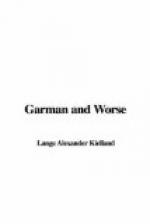Her clear blue eyes sparkled as she spoke. He looked at her with rapture, and with a sudden change of manner that was characteristic of him, he said in a calm, quiet voice:
“I will live a life of falsehood no longer!” He took a few steps, and said slowly and with emphasis, “I will ask the provost’s permission to preach in the church next Sunday; I have, in fact, already said something to him about it. I want to tell the congregation—”
“It would, perhaps, be scarcely worth while,” said Rachel, “to go too much into details.”
“No, that was not my intention. I wish to bring forward the importance of sincerity. I will tell them plainly that I have my doubts, and that God is to be found in truthfulness, and not in mere forms; and I wish especially to examine the position of those of my own calling, who even more than others are fettered by forms and ceremonies.”
“It may cost you your future; and in any case you will make many enemies.”
“But perhaps I may make one friend.”
“You shall have my friendship,” said she, giving him her hand, “if you find any support in that. You can count upon me, even if all others turn their backs upon you.”
“Thank you,” said he, with solemnity, as he let go her hand. He left the garden hastily, but without going through the house; he took a side path, and went through the little wicket gate.
Rachel stood gazing after him as he went down the avenue. At last she had met a man who dared to state his convictions. This was more than ever Jacob Worse would have the courage to do.
CHAPTER X.
Jacob Worse’s mother was regarded as quite a character in the town. When her husband died, he was about as insolvent as a man could be. For several years he had only kept his business going by means of unlimited credit, but up to the very last he managed to keep one of the gayest houses in the town. Nothing was left but a mass of bills and liabilities when he was gone. People shook their heads, and went one and all to the widow to condole with her. There were both friends and enemies among them, but all alike were creditors. Some were for selling her up at once, and others wished to keep the business going, while one wished to buy the horses privately. The “Boston-parti"[A] to which the deceased belonged, agreed to give the widow a monthly allowance. For a few days Mrs. Worse was quite bewildered and broken down by the ruin she had so little expected. She had never had the slightest knowledge of her husband’s affairs, but she was quite convinced that he was very rich. On the evening after the funeral she was sitting alone with her son Jacob, who was a boy of about seven or eight, when a little wizened, grey-haired man came into the room, who, after respectfully wishing Mrs. Worse good evening, laid on the table some account-books and papers. The old man was well known to Mrs.




